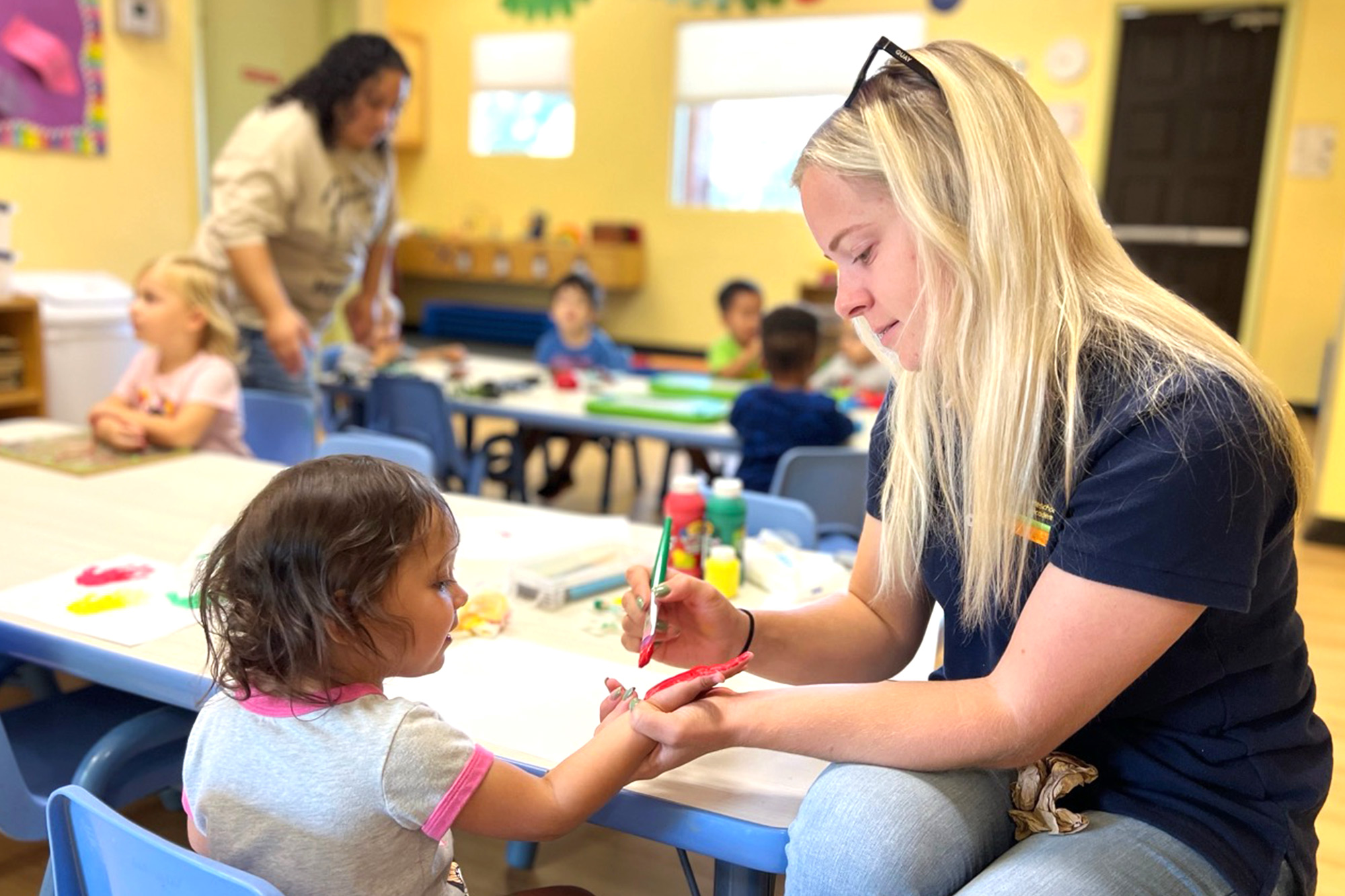
If you’ve ever wondered how daycare teachers in
Placentia
andYorba Linda
manage to stay calm when 20+ preschoolers are having various meltdowns throughout the day, you’re not alone. As parents, we often feel like we’re barely surviving one child’s tantrum – so how do professional educators handle multiple children’s big emotions while keeping their composure?The secret isn’t superhuman patience – it’s professional training, proven strategies, and systems that you can adapt for your own home.
The Childcare Advantage : Why Trained Staff Can Stay Calmer Than Parents
1. Emotional Distance Creates Clarity
What daycare staff experience : When a child has a meltdown, you don’t have the same relationship as a parent or family member, which aids in you decision making. This creates space for logical thinking.
What parents experience : When your child melts down, your natural instinct is to fix it fast – often leading to rushed decisions that escalate the situation.
The learning opportunity : At
Village Preschool Academy in Placentia
, our staff model how stepping back emotionally to allow older children to self regulate (while staying physically present) often resolves tantrums faster than jumping in immediately.2. They’ve Seen It All Before
Professional perspective : Experienced Yorba Linda daycare staff have witnessed thousands of tantrums. They know that:
- Most tantrums last 2-5 minutes if left unescalated
- Children get upset for predictable reasons (hunger, tiredness, overstimulation, transition difficulty)
- The intensity usually peaks and then naturally decreases
Parent perspective : Each tantrum feels unique and urgent when it’s your child, making it harder to see the patterns.
Professional Tantrum Management Strategies You Can Use at Home
Strategy 1 : The “Narrate and Validate” Technique
How daycare staff do it : “I can see you’re really upset about cleaning up the blocks. It’s hard when we have to stop playing something fun.”
Why it works : Children feel heard without the adult trying to immediately solve or stop the emotion.
Instead of “Stop crying” or “It’s not a big deal,” try “You’re really disappointed that we have to leave the park. That’s a big feeling.”
Strategy 2 : The Predictable Response System
At Village Preschool Academy : Our staff in Placentia use a similar response sequence for every most incidents of upset:
- Ensure safety first
- Keep a low voice (never raise it)
- Get down to the child’s eye level
- Acknowledge the feeling
- Wait for the peak to pass
- Offer simple choices when the child is ready to listen
Why consistency matters : When children know what to expect from adults during emotional moments, they feel safer and can regulate faster.
Home adaptation : Develop your own consistent response and stick to it, even when you’re tired or frustrated.
Strategy 3 : Environmental Prevention
What our enrichment programs teach us : Children in our Placentia location have fewer incidents of upset during our structured activities (music, dance, soccer, yoga) because:
- Clear expectations are set in advance
- Physical movement helps emotional regulation
- Children have appropriate outlets for big energy
Prevention techniques you can implement :
- Predict difficult transitions: “In 5 minutes, we’ll clean up for dinner”
- Offer choices within boundaries: “Would you like to walk to the car or be carried?”
- Ensure basic needs are met: Hungry or tired children have fewer emotional resources
Strategy 4 : The Professional Mindset Shift
How daycare staff think about fits :
- Tantrums are information about the child’s needs
- Big emotions are normal and temporary
- The goal isn’t to stop the upset but to help the child move through it safely
How parents often think about tantrums :
- Tantrums are behavior problems to be fixed
- They reflect on our parenting abilities
- They need to be stopped immediately
Mindset shift for parents : Try viewing tantrums as your child’s way of communicating an unmet need rather than defiance or manipulation.
What Makes Placentia Daycare Programs Effective
Montessori-Inspired Emotional Learning
At
Village Preschool Academy
, our Montessori approach naturally reduces tantrums because:- Children have more control over their environment and activities
- Mixed-age classrooms provide natural mentoring and emotional modeling
- Hands-on learning gives children appropriate outlets for their energy and curiosity
Professional Staff Training
Our
Yorba Linda
and
Placentia staff
receive ongoing training in:
- Child development stages and appropriate expectations
- De-escalation techniques
- Environmental factors that trigger behavioral challenges
- When to intervene vs. when to provide space
Advanced Strategies from Experienced Daycare Staff
The “Calm Down Corner” vs. “Time Out”
Traditional time out : Isolation until the child stops crying Daycare calm down corner: A comfortable space with sensory tools where children can regulate themselves
Home setup : Create a cozy spot with soft blankets, stress balls, or calming music where your child can go when overwhelmed (not as punishment, but as a support).
The Power of Routine During Emotional Moments
What we observe : Children who attend our enrichment programs (music, dance, sports) learn emotional regulation through structured activities with clear beginnings and endings.
Home application : Having predictable routines for difficult times helps children know what to expect and feel more secure.
Professional Boundary Setting
How daycare staff stay calm : They maintain clear, kind boundaries without taking children’s emotions personally.
Example :
“I can see you’re angry, and I’m going to keep you safe. Hitting isn’t allowed, but you can stomp your feet or squeeze this stress ball.”
Red Flags : When an Upset Needs Professional Attention
Experienced Placentia daycare staff know to recommend additional support when children:
- Have tantrums lasting longer than 20 minutes regularly
- Show aggressive behavior toward themselves or others consistently
- Seem unable to be comforted by usual strategies
- Have tantrums that interfere with their ability to participate in activities
The Parent-Daycare Partnership
What you can learn from research and tested methods: Professional strategies and consistency What we learn from you: Your child’s specific triggers, comfort strategies, and family values
Best outcomes happen when: Parents and daycare staff use similar approaches, creating consistency across environments.
Putting It All Together : A Day in the Life
Here’s how our Placentia staff might handle a typical tantrum scenario:
3-year-old Sarah doesn’t want to transition from playground to lunch:
- Staff notices early warning signs (getting louder, moving erratically)
- Gives advance warning: “Sarah, in 2 more minutes we’ll go inside for lunch”
- Offers choice: “Would you like to walk or hop like a bunny to the lunch table?”
- When tantrum begins: Gets down to eye level, speaks calmly: “You’re upset about leaving the playground. That’s hard.”
- Stays physically close but doesn’t rush the process
- When she’s ready: “Are you ready for lunch, or do you need one more minute to feel to calm your body?”
The result : Most incidents of upset resolve within 3-5 minutes, and Sarah feels heard and supported rather than negative reactions for having big emotions.
What This Means for Yorba Linda and Placentia Parents
You don’t need to become a professional
early childhood educator
, but you can absolutely benefit from these strategies. The goal isn’t to eliminate tantrums (they’re a normal part of development) but to help children move through them more quickly and feel supported in the process.
Consider how our approach at Village Preschool Academy might complement your parenting style. When children experience consistent, calm responses to their big emotions both at home and at daycare, they develop stronger emotional regulation skills overall.
Want to see these strategies in action? Visit our
Placentia
andYorba Linda
locations to observe how our trained staff handle challenging moments with patience and professionalism. Our enrichment programs and Montessori-inspired environment provide natural opportunities for children to practice emotional regulation in a supportive community setting.Schedule a tour today to learn how Village Preschool Academy can partner with your family to support your child’s emotional development.
